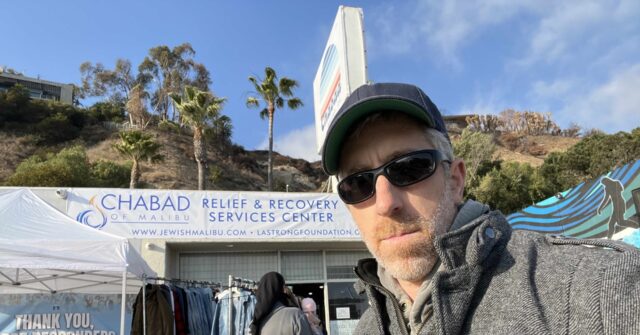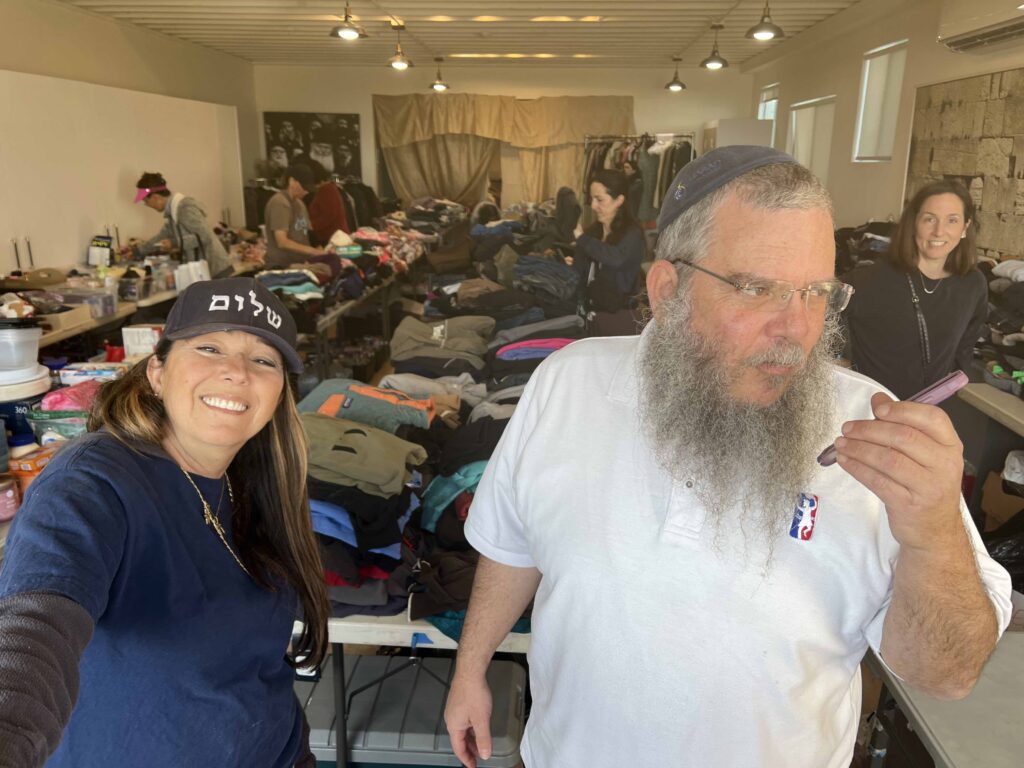I’m the chaperone tonight, and yet I’m barely managing a storm of emotions.
My eldest daughter is sitting next to me. She loves rock ‘n’ roll — she plays several instruments — and she’s taking in the spectacle, marveling at her heroes, wowed by all the cameo acts.
I took her to the fire zone on Monday, when they finally let civilians in — thanks to President Donald Trump, who publicly pressured Mayor Karen Bass to let the residents return, if only to grieve our losses.
She cried to see the destruction, but smiled again to see our neighbors, who came back to pick up the pieces — a few ceramic animals, a fragment of a child’s school project, even a framed photo or two.
We’re sitting three rows behind Steve Ballmer, one of the world’s richest men, who is matching every contribution tonight, and I’m wearing a donated coat. My own coats are unwearable, damaged by smoke and whatever else blew into my house through the cracks in the doors and windowpanes, after evading the row of ficus trees, the sentinels that kept the embers off our home.
A few days before the fire, I put several bags of clothing in my driveway for collection by a local charity. Little did I know that in a few days, I’d need someone’s hand-me-down.
Yes, I can still afford to buy a coat — if I had thought about it, I probably would have. But I haven’t had much time to think, much less to go shopping. I’ve barely slept in three weeks.
The coat was there one day, on a rack, out side the Chabad House next to the falafel stand in Malibu where I had taken some Israeli firefighters for a meal.
I left it on the rack at first, thinking perhaps someone else might need it more than me. But on my way home, it was still there. So I took it.
I’m wearing this charity. So are we all, in a way.
I took a coat. But I also gave some weights from my intact garage to a personal trainer whose equipment was stuck inside the fire zone, and who needed to keep working, even if half of her clients had been scattered across Southern California.
Another lady, who lost her home, bought groceries for us from the Santa Monica farmer’s market because she knew that we couldn’t get to the stores easily — not with four kids, including a four-month-old baby, suddenly sharing a 2-bedroom Airbnb instead of a 5-bedroom house, with Instacart suddenly a luxury.
Everyone’s helping everyone.
I’m covering the fire for Breitbart News. But I’ve also been helping people take photos of their property, look for lost pets, tow their cars out of the fire zone. I’ve helped the police look for missing people and I’ve helped the firefighters figure out where the relics are from the local parish church and as of last week I’ve helped the President of the United States understand what happened here, and what needs to happen, and he’s helped us open up the town again.
And everybody’s helping everybody, and I’ve never felt so connected to my neighbors before. And, really, to the rest of L.A. and America.
Charity is an interesting thing. We tend to think of it as the rich giving to the poor, a kind of redistribution of wealth, maybe “social justice.”
I don’t know what “justice” can mean in this context — when my house is standing and almost everything around it is gone. It’s not because I’m a better person — trust me, I’m not. And if it were because of the holy books on my shelf, or the mezuzot on my doors, then tell me why the rabbi’s home burned down and mine did not?
No, this is not about justice.
Life can be random. Some people have and others do not — and sometimes those who have everything lose it all. Palisades is full of rich people who became suddenly poor. Many lost their fire insurance days before the fire.
There’s a Jewish concept that charity is something even the poorest person must give. It’s a way of helping a poor person see his or her own value — but it’s also a statement about what charity is.
Charity isn’t just about generosity. It’s about the connections between us, an acknowledgment that we need each other. The rich need the poor, too.
A rabbi standing amid the ruins with me made the observation that the person who receives charity does more for the giver than the person who gives does for the one who receives.
Music, too, is an interesting thing. We need to sing, even when we are sad. And to laugh. Billy Crystal, once the honorary mayor of Palisades, opened the Fire Aid show, told us how he lost his house, then told a few jokes.
We Americans process our grief through these collective events — and I guess I do that, too, but I also deal with difficult times by writing.
So I’m sitting here, in my donated coat, jotting down my column, listening to Pink sing Janis Joplin, whom I have to explain to my daughter, and I’m thinking: this year’s going to be a little rough, day by day, but I think the future is actually looking kind of incredible.
I don’t know why, or maybe I do.
Joel B. Pollak is Senior Editor-at-Large at Breitbart News and the host of Breitbart News Sunday on Sirius XM Patriot on Sunday evenings from 7 p.m. to 10 p.m. ET (4 p.m. to 7 p.m. PT). He is the author of The Agenda: What Trump Should Do in His First 100 Days, available for pre-order on Amazon. He is also the author of The Trumpian Virtues: The Lessons and Legacy of Donald Trump’s Presidency, now available on Audible. He is a winner of the 2018 Robert Novak Journalism Alumni Fellowship. Follow him on Twitter at @joelpollak.
Breitbart News
Read the full article .



